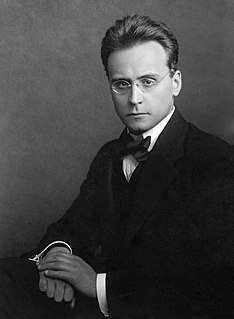A Quote by Claude Brown
The language of soul. . . possesses a pronounced lyrical quality which is frequently incompatible to any music other than that ceaseless and relentlessly driving rhythm that flows from poignantly spent ideas.
Related Quotes
We sift reality through screens composed of ideas . (And such ideas have their roots in older ideas.) Such idea systems are necessarily limited by language , by the ways we can describe them. That is to say: language cuts the grooves in which our thoughts move. If we seek new validity forms (other laws and other orders) we must step outside language.
Style is a very simple matter; it is all rhythm. Once you get that, you can't use the wrong words. But on the other hand here am I sitting after half the morning, crammed with ideas, and visions, and so on, and can't dislodge them, for lack of the right rhythm. Now this is very profound, what rhythm is, and goes far deeper than any words. A sight, an emotion, creates this wave in the mind, long before it makes words to fit it.
A language possesses utility only insofar as it can construct conventional boundaries. A language of no boundaries is no language at all, and thus the mystic who tries to speak logically and formally of unity consciousness is doomed to sound very paradoxical or contradictory. The problem is that the structure of any language cannot grasp the nature of unity consciousness, any more than a fork could grasp the ocean.
The English landscape at its finest - such as I saw this morning - possesses a quality that the landscapes of other nations, however more superficially dramatic, inevitably fail to possess. It is, I believe, a quality that will mark out the English landscape to any objective observer as the most deeply satisfying in the world, and this quality is probably best summed up by the term 'greatness.'
Vocals are not central to what I do, and I've never liked singing live. I've always been more inspired by rhythm, texture, harmony than vocal melodies and lyrics. Plus, for me, I can better express my musical ideas through instrumental music than vocal music, the emotional interpretation of which can easily supersede the actual musical content or aim.


































